Ditapis dengan
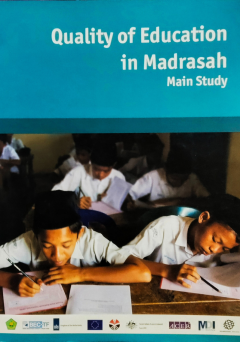
Quality of Education in Madrasah : Main Study
The quality of education is a multifaceted concept that encompasses various dimensions such as curriculum effectiveness, teaching methodologies, learning outcomes, infrastructure, and educational equity. It is a critical determinant of individual development, societal progress, and economic growth. Evaluating and improving educational quality involves assessing factors like student achievement,…
- Edisi
- 1
- ISBN/ISSN
- -
- Deskripsi Fisik
- 160 halaman
- Judul Seri
- Textbook
- No. Panggil
- 353.5 THE q
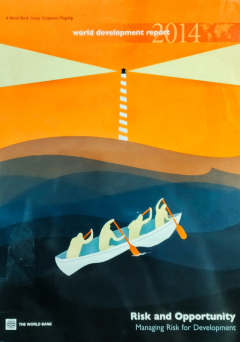
World Development Report 2014 : Risk and opportunity managing risk for develo…
The "World Development Report 2014: Risk and Opportunity - Managing Risk for Development" provides a comprehensive analysis of the role of risk management in global development. Focusing on the intersection of risk, resilience, and sustainable development, the report examines how various forms of risk—economic, environmental, social, and political—affect development outcomes. It explores st…
- Edisi
- 1
- ISBN/ISSN
- -
- Deskripsi Fisik
- 343 halaman
- Judul Seri
- Textbook
- No. Panggil
- 353.5 THE w
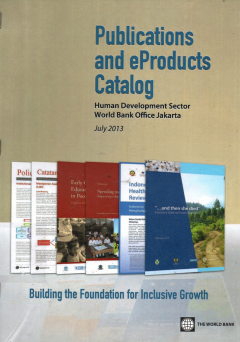
Publications and eProducts Catalog Human Development Sector World Bank Office…
The Publications and eProducts Catalog for the Human Development Sector at the World Bank Office Jakarta serves as a comprehensive guide to the various publications and electronic products produced by the sector. This catalog highlights the World Bank's commitment to fostering human development through knowledge dissemination, research, and policy advice in Indonesia.
- Edisi
- July 2013
- ISBN/ISSN
- -
- Deskripsi Fisik
- 45 halaman ; ilustrasi berwarna
- Judul Seri
- Textbook
- No. Panggil
- 011.52 WOR p
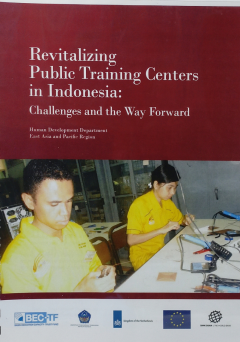
Revitalizing Public Training Centers in Indonesia: challenges and the way for…
This study examines the challenges faced by Public Training Centers (PTCs) in Indonesia and proposes strategies for their revitalization. PTCs play a crucial role in providing vocational and skills training to enhance employability and economic development. However, these centers encounter various obstacles, including inadequate funding, outdated facilities, and a mismatch between skills taught…
- Edisi
- July 2011
- ISBN/ISSN
- -
- Deskripsi Fisik
- 56 halaman
- Judul Seri
- Textbook
- No. Panggil
- 374.9598 WOR r
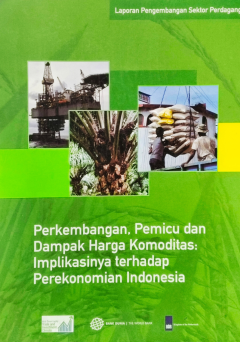
Laporan Pengembangan Sektor Perdagangan : Perkembangan, Pemicu dan Dampak Har…
Laporan ini menyajikan analisis mendalam tentang perkembangan sektor perdagangan di Indonesia dengan fokus utama pada pergerakan harga komoditas, pemicunya, dan dampaknya terhadap perekonomian nasional. Perdagangan komoditas memiliki peran sentral dalam ekonomi Indonesia, mempengaruhi pertumbuhan ekonomi, inflasi, dan stabilitas makroekonomi secara keseluruhan.
- Edisi
- 1
- ISBN/ISSN
- -
- Deskripsi Fisik
- 296 halaman
- Judul Seri
- Textbook
- No. Panggil
- 353.5 THE l
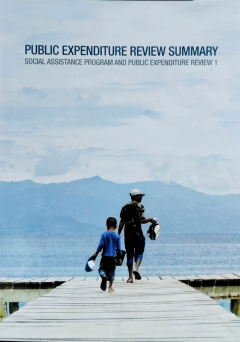
Public Expenditure Review Summary : Social Assistance Program and Public Expe…
Public expenditure on household-based social assistance (SA) in Indonesia has increased significantly since 2005. From a low base in the early 2000s, Indonesia's aggregate national public expenditures on SA permanently increased from 2005 after the central government allocated a portion of the savings from fuel subsidy reforms to a number of SA initiatives.
- Edisi
- 1
- ISBN/ISSN
- -
- Deskripsi Fisik
- 27 halaman
- Judul Seri
- Textbook
- No. Panggil
- 353.5 THE p
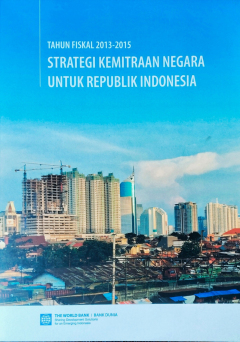
Strategi Kemitraan Negara untuk Republik Indonesia : Tahun Fiskal 2013 - 2015
Strategi Kemitraan Negara (Country Partnership Strategy/CPS) merupakan dokumen perencanaan yang penting bagi hubungan kerja sama antara pemerintah Republik Indonesia dan mitra pembangunan internasional. Strategi ini dirancang untuk mendukung prioritas pembangunan nasional serta meningkatkan efektivitas bantuan luar negeri dalam mencapai tujuan pembangunan yang berkelanjutan. CPS untuk periode 2…
- Edisi
- 1
- ISBN/ISSN
- -
- Deskripsi Fisik
- 101 halaman
- Judul Seri
- Textbook
- No. Panggil
- 330.05 THE s
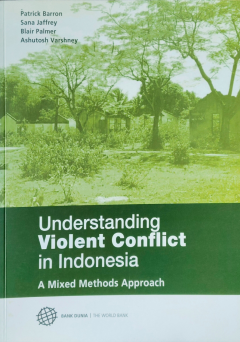
Understanding Violent Conflict in Indonesia : a mixed method approach
The Violent Conflict in Indonesia Study (ViCIS) is a new the World Bank project aimed at plugging gaps in the literature and adding to popular knowledge on violent conflict in Indonesia. The study aims to help the Government of Indonesia and others to formulate programs and policies to promote peaceful development and effective violence prevention.
- Edisi
- 1
- ISBN/ISSN
- -
- Deskripsi Fisik
- 57 halaman
- Judul Seri
- Textbook
- No. Panggil
- 353.5 THE u
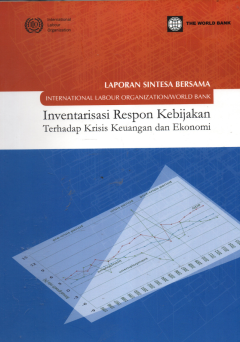
Laporan Sintesa Bersama International Labour Organization/World Bank: Inventa…
Laporan sintesa ini disusun sebagai hasil kerjasama antara International Labour Organization (ILO) dan World Bank, dengan tujuan untuk menginventarisasi dan menganalisis respon kebijakan terhadap krisis keuangan dan ekonomi global. Laporan ini bertujuan untuk memberikan wawasan mendalam mengenai berbagai kebijakan yang telah diimplementasikan oleh negara-negara di seluruh dunia dalam menghadapi…
- Edisi
- 1
- ISBN/ISSN
- -
- Deskripsi Fisik
- viii + 60 halaman
- Judul Seri
- Textbook
- No. Panggil
- 330.9 ILO l
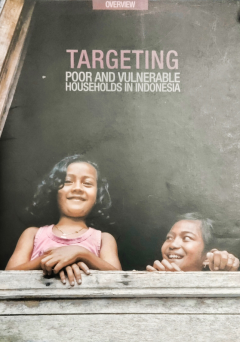
Targeting Poor Vulnerable Households in Indonesia
Targeting Poor and Vulnerable Households in Indonesia is a product of the Poverty Group, a unit in the Poverty Reduction and Economic Management (PREM) team of the World Bank Offi ce Jakarta. The team, led by Vivi Alatas (Senior Economist, EASPR), provides technical and policy advice based on sound empirical research and analysis to the Government of Indonesia in support of national poverty red…
- Edisi
- 1
- ISBN/ISSN
- -
- Deskripsi Fisik
- 36 halaman
- Judul Seri
- Textbook
- No. Panggil
- 362.5 THE t
 Karya Umum
Karya Umum  Filsafat
Filsafat  Agama
Agama  Ilmu-ilmu Sosial
Ilmu-ilmu Sosial  Bahasa
Bahasa  Ilmu-ilmu Murni
Ilmu-ilmu Murni  Ilmu-ilmu Terapan
Ilmu-ilmu Terapan  Kesenian, Hiburan, dan Olahraga
Kesenian, Hiburan, dan Olahraga  Kesusastraan
Kesusastraan  Geografi dan Sejarah
Geografi dan Sejarah